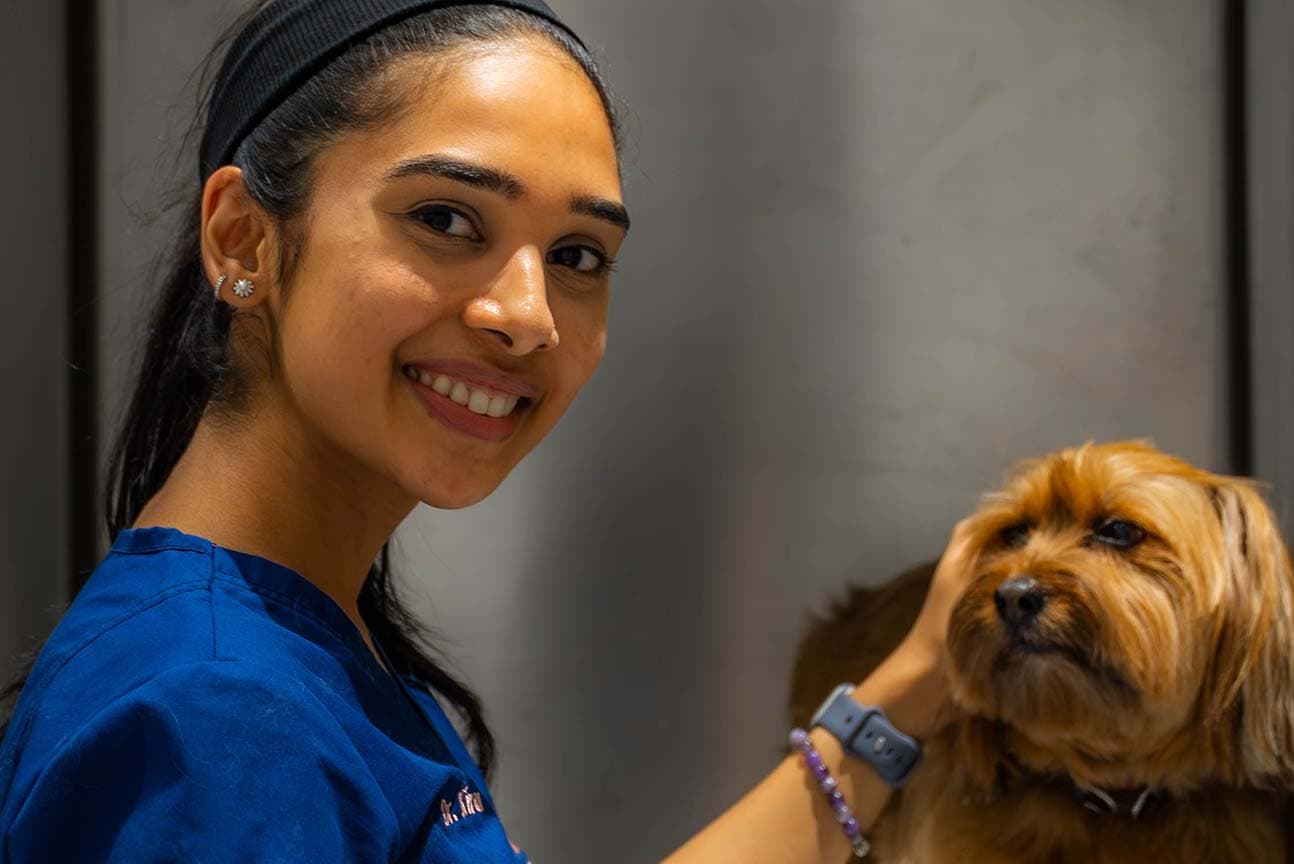Reviewed by Dr. Ionut Rusu
Updated on 06/09/2025
Reading time 4 min.
Overview
Severity: Low
Life stage: All
Vomiting is one of the most common health concerns in dogs. Many cases settle on their own or with simple diet changes, but Dubai’s extreme climate increases the risk of rapid dehydration and complications of heat stress, especially if diarrhoea is also present. Any dog can suffer from vomiting, but puppies, elderly dogs, and short-faced breeds are particularly vulnerable in temperatures above 35°C. By recognising the risks early, you can act quickly and make sure your dog gets the best care at the right time
What to Do if Your Dog Is Vomiting.
Warning signs your dog is about to vomit include drooling, lip smacking, gagging and retching, restlessness, and heaving abdominal muscles. Dogs will often try to eat any vomit containing food remains, sometimes hiding the extent of the problem.
If Your Dog Has Been Sick but Remains Happy and Bright:
- Withhold food for 6-12 hours after vomiting: This excludes puppies under 12 weeks, diabetic dogs, and pregnant females. Talk to a vet if unsure.
- Encourage fluid intake: Offer small, frequent drinks of cool, clean bottled or filtered water. Ice cubes work well for reluctant drinkers.
- Keep cool: Ensure the temperature indoors stays at 22-24°C with air conditioning.
- Feed small amounts of a bland diet, such as plain boiled chicken and rice, white fish, or scrambled eggs.
- Monitor closely for worsening or new symptoms.
Contact your vet without delay if your dog can’t keep down any food or water.
Most Common Causes of Vomiting in Dogs
- Diet-related: Eating the wrong things, eating too quickly, sudden diet changes or going too long without food.
- Food allergies and intolerance: Food reactions causing sickness, diarrhoea, or skin issues; common in French Bulldogs, Labradoodles, and Golden Retrievers.
- Foreign bodies: Toys, sticks or other swallowed objects, especially in puppies and keen chewers.
- Infections: Viral, bacterial or parasitic, sometimes seasonal ‘stomach bugs’.
- Heat: Empty stomachs, heat stress, gulping water, and dehydration all increase the risk.
- Poisons: Certain human foods, plants or household chemicals.
- Dubai hazards: Toxic desert plants, construction site debris, feeding changes around Ramadan, and cultural celebrations.
- Serious illness: GDV (bloat) in large and giant breeds, pancreatitis, kidney disease, and diabetes.
When to Worry about Vomiting
Seek immediate veterinary care if your dog
- Is vomiting continuously
- Brings up vomit containing fresh blood or ‘coffee-grounds’ (digested blood)
- Retches repeatedly without producing vomit
- Develops a swollen, tense, hard or painful abdomen
- Becomes dehydrated: signs of this include lethargy, with dry, tacky gums and skin that doesn’t spring back when lifted or tented
- Is weak, collapsed or has pale gums
- Has eaten or is suspected of eating something poisonous or otherwise harmful
Schedule a vet appointment within 24 hours if your dog:
- Is still vomiting after 24 hours
- Vomits every day, despite being otherwise well
- Has both vomiting and diarrhoea
- Starts to lose appetite, energy or seems dull and disinterested
- Is a puppy under 12 months or an elderly dog
How to prevent vomiting
General Prevention
- Feed a complete high-quality diet
- Keep worming and vaccinations up to date
- Provide durable, size- and age-appropriate toys for your dog. Replace these promptly when showing signs of wear
- Discourage scavenging during walks
- Clean food bowls after meals (bacteria multiply rapidly in heat)
- Use slow-feeding bowls to prevent gulping
Climate-related measures
Keeping your dog safe in Dubai’s hottest months and times of day
- Ensure free access to clean, fresh, cool water 24/7
- Feed during cooler hours of the day: early morning (6-7am) and evening (7-8pm)
- Maintain temperature to a steady 22-24°C indoors
- Avoid exercising during the hottest times of the day (10am-4pm) and until at least one hour after meals
Local Hazard Awareness:
- Research toxic desert plants
- Be aware of construction debris and its risks
- Plan ahead for changes in feeding and activity routines during cultural celebrations
How vets investigate vomiting and its causes
Your vet will examine your dog and may recommend further tests such as:
- Blood tests: Checking organ function and general health
- Urine tests: Assessing dehydration, abnormal contents and infection
- Imaging: X-rays or ultrasound for blockages and other changes in the gut
- Stool (poo) samples: Testing for parasites
- Endoscopy: Using a tiny camera to examine the inside of the stomach and small intestine in complex cases
- Biopsy: Collecting tissue samples for laboratory analysis in chronic conditions
How to treat a vomiting dog at home
For dogs who are otherwise bright and well, home treatment may be an option.
First 6-12 hours:
- Withhold food, provide fresh water
- Offer small amounts of clean, purified or bottled water every 30 minutes
- Maintain the home at 22-24°C
- Monitor for worsening or new symptoms
- Avoid outdoor activities during the hottest part of the day (10am-4pm)
Days 1-2:
- Feed bland foods: boiled chicken with rice, sweet potato, white fish, scrambled eggs
- Start with a tiny amount of food. Continue to offer small amounts every 2-3 hours if no vomiting occurs
- Offer around half of the dog’s normal total amount for the first 24 hours and increase gradually as symptoms improve
Days 3-7:
- Gradually transition to normal food over 4-5 days
- Mix increasing amounts of regular food with the bland diet
- Monitor for symptom recurrence
Emergency support: Offer small amounts of home-prepared, low-sodium bone broth when vet care isn’t immediately available. This is rich in the electrolytes (natural salts and minerals) essential for normal body function.
Veterinary treatment for vomiting in dogs
Prescription Medicine:
- Anti-sickness and anti-nausea medication
- Gastric protectants: Soothe the irritated stomach lining and promote healing
- Prescription diets: Specialised nutrition for sensitive stomachs
- Anti-sickness and anti-nausea drugs
- Pain relief if needed
Supportive care:
- Emergency Fluid therapy: Fluids given directly into your dog’s veins for severe cases
- Prescription diets for sensitive stomachs
- Probiotics: To restore gut health, particularly where diarrhoea is also present
Advanced treatments:
- Emergency surgery: Removing foreign objects or addressing serious conditions, such as gastric torsion (twisted stomach) or volvulus
- Hospitalisation for severe cases
Your vet may also advise on specific requirements, such as temperature control, providing quiet spaces to rest, water access, and stress-free feeding.
Dogs at increased risk of vomiting
Age factors:
- Puppies and elderly dogs have limited reserves, therefore a high risk of rapid dehydration
- Senior dogs: more prone to other serious and/or chronic illnesses
Breed considerations:
- Brachycephalic breeds: struggle to control body temperature and breathing (including Pugs, French bulldogs, Cavalier King Charles Spaniels)
- Large and giant breeds: higher risk of bloat in hot weather
- Breeds prone to food intolerances and food allergies
- Miniature breeds: small body mass loses fluids quickly
Health and lifestyle:
- Dogs with other health conditions: kidney disease, diabetes, liver disease, pancreatitis
- Certain medications may cause stomach irritation, including non-steroidal painkillers and antibiotics
- Dogs that scavenge or have access to human food
- Sudden changes in diet
- Severe stress
Dubai-specific risks:
- Newly arrived dogs may initially struggle with adapting to the climate
- Exercising inappropriately during the hottest hours of the day
- Inadequate shade and access to water
Worried about your dog’s vomiting? Book a check-up or emergency visit today at Modern Vet Hospital in Dubai. Our experienced team offers on-the-spot diagnostics, urgent fluid therapy, and treatment tailored to your pet’s needs. Whether it’s a peace-of-mind check-up or sudden, severe vomiting, Modern Vet Hospital is your trusted partner for compassionate, expert care in the UAE’s challenging climate.
Share this, choose your platform!
Reviewed by
Dr. Ionut Rusu
USAMV, RCVS
Dr. Ionut Rusu is a senior veterinarian with nearly a decade of successful experience in the field. He graduated in 2014 from the University of Agricultural Sciences and Veterinary Medicine (USAMV) in Cluj-Napoca, Romania.


